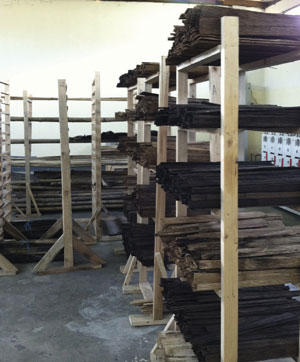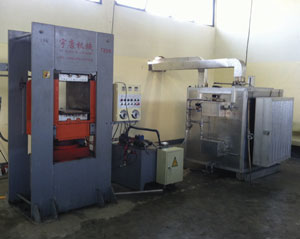Difference between revisions of "Biomass-Powered Thermal Processing of Ethiopian Bamboo"
***** (***** | *****) |
***** (***** | *****) |
||
| Line 41: | Line 41: | ||
<br/> | <br/> | ||
| − | |||
= Clean Energy Solution<br/> = | = Clean Energy Solution<br/> = | ||
| Line 48: | Line 47: | ||
<p style="text-align: center;">{{#widget:YouTube|id=m9rNCe1ZwbY|height=400|width=800}}<br/></p> | <p style="text-align: center;">{{#widget:YouTube|id=m9rNCe1ZwbY|height=400|width=800}}<br/></p> | ||
<br/> | <br/> | ||
| − | |||
= Impact<br/> = | = Impact<br/> = | ||
| Line 84: | Line 82: | ||
<references /> | <references /> | ||
| + | [[Category:Biomass]] | ||
| + | [[Category:Productive_Use]] | ||
| + | [[Category:Ethiopia]] | ||
[[Category:Powering_Agriculture]] | [[Category:Powering_Agriculture]] | ||
| − | |||
| − | |||
| − | |||
Revision as of 13:33, 23 May 2016
Overview
|
African Bamboo |
| |
|
Project |
||
|
Collaborators |
Heartland Global (USA) | |
|
Location Applied |
||
| In Ethiopia, there are more than one million hectares of bamboo. Recognized as a fast-growing and largely sustainable raw material, there is an increasing global demand for bamboo as a wood substitute for a variety of construction and furnishing applications. However, bamboo resources are often poorly managed. Most in the industry have limited knowledge of modern value-added processing techniques, which limit their earning potential.[1] |
Clean Energy Solution
African Bamboo is developing an environmentally friendly bamboo thermal modification process called ThermoBoo. Through this chemical-free process, decay factors such as rot and insects are virtually eliminated, and the thermally-modified bamboo fiber can be further processed into sturdy panels that can be marketed to a range of domestic and international buyers. The ThermoBoo process involves the combustion of biomass dust - a technological approach that is completely new to Ethiopia. Through the project’s successful implementation of a pilot processing facility, African Bamboo envisions developing a replicable model that can lead to prospective business opportunities throughout the region.[1]
Impact
The success of this project will lead to new opportunities for export, employment, and manufacturing in Ethiopia. In addition to its socio-economic impact, bamboo cultivation of native species plays a significant role in reforestation by stabilizing soil. African Bamboo uses environmental impact assessments to ensure the continued promotion of bamboo’s environmental benefits, and the minimization of the company’s ecological footprint.[1]
Organization
African Bamboo is a forestry, wood, and bio-energy company located in Addis Ababa, Ethiopia, among Africa’s largest reserves of bamboo, African Bamboo develops innovative applications for bamboo, particularly for industrial and commercial uses. The company was established in 2012 as a subsidiary of Fortune Enterprise PLC which, since 1961, has been a manufacturer of wood and metal products in Addis Ababa.[1]
Progress Update
Over the past two years, African Bamboo has completed the system design and engineering for the thermal modification facility. Remote-sensing technology has been utilized to take stock of the bamboo resources available in the project area. Thirty farmer cooperatives (more than 2200 farmers) have been established in order to give small-scale farmers a voice. An additional 50 farmers have been added as bamboo suppliers. Construction of three factory halls began in July 2015, with completion scheduled for March 2016. The commercial factory will be operational in 2017. Five contracts were issued to undertake the final phase of testing and certification at a commercial scale.[1]
Further Information
- Ethiopia Energy Situation
- Productive Use of Thermal Energy
- Website Powering Agriculture Homepage, Winners/ Innovators
- Powering Agriculture: An Energy Grand Challenge for Development
- Website Heartland Global






















